

Issue 225 May/June 2024 Familiesonline.co.uk
FREETakeMeHome
Summer camps Birthdays Education
IN THIS ISSUE South East



Design and construct flowers with Smoby Flower Market Creations Petals can be re-used plus refill packs available Includes flower press and flower parts Ages 3+













Familiesonline.co.uk Families South East London 2 Apply for a free or subsidised place Over 200 pupils at Dulwich receive a bursary. Find out more by scanning the QR code
knew it was right for him
we visited the school.
felt
like he belonged there.” Parent Bursaries of up to 100% of fees are available Smoby Flower Market Creations Kit Giveaway
APPLY at familiesmag.co.uk/go T&Cs apply
“I
when
Something just
right,
Worth £39.99
020 8241 0423
Sales Patricia Holloway patricia.holloway@familiespublishing.co.uk 07980 556813
Design Rebecca Carr rebecca@familiesmagazine.co.uk 07789 882467
Next issue: July/August
Booking deadline: 5 June
Jan/Feb giveaway recipients
Congratulations to all our winners. You can find a list at www.bit.ly/JF24recipients
Would you like to feature your business in our July/August issue? Call Patricia today on 07980 556813 for more information.
Welcome
Are you all set for the warmer weather? Summer is officially just a few weeks away…!
And it’s a great time to think about building more physical activity into your family diary. Choose an outdoor sport or enrol your child in swimming classes – after all, swimming is the only active pursuit that can save your child’s life. Take a look at our article from Swim England about the vital skills your child will learn at school and private swimming classes. Or consider a summer camp for your child that will get them active.
What birthday traditions do you have to celebrate your child’s birthday? It’s lovely to develop and maintain these as a way of marking the special day each year and we have some lovely suggestions as to how you can do that.
Finally, in this issue, we have a Smoby Flower Market to giveaway! Apply inside. By doing so, you’ll also ensure you receive our digital magazine with lots more content and goodies on offer. Help

020

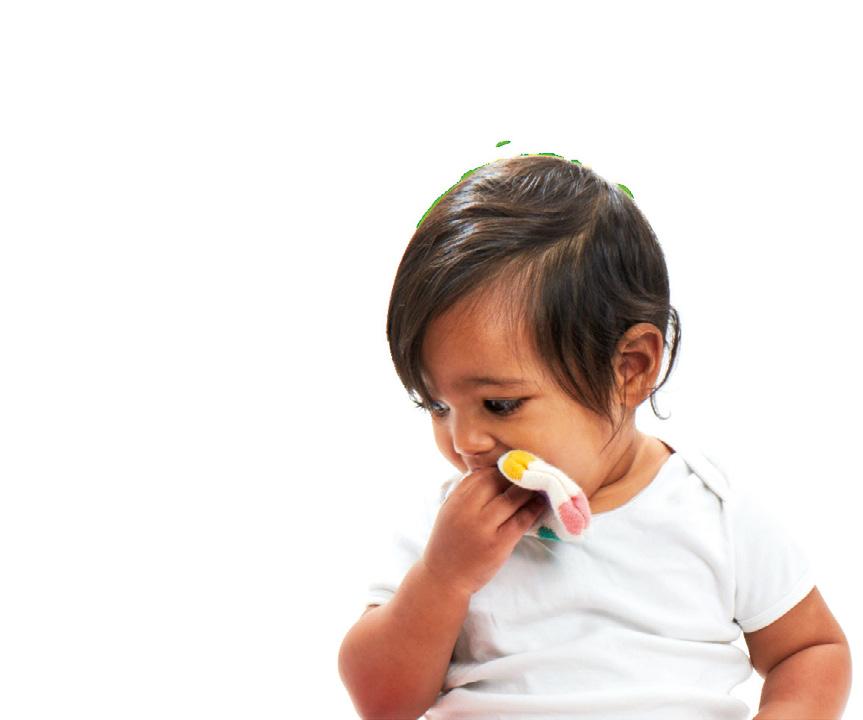
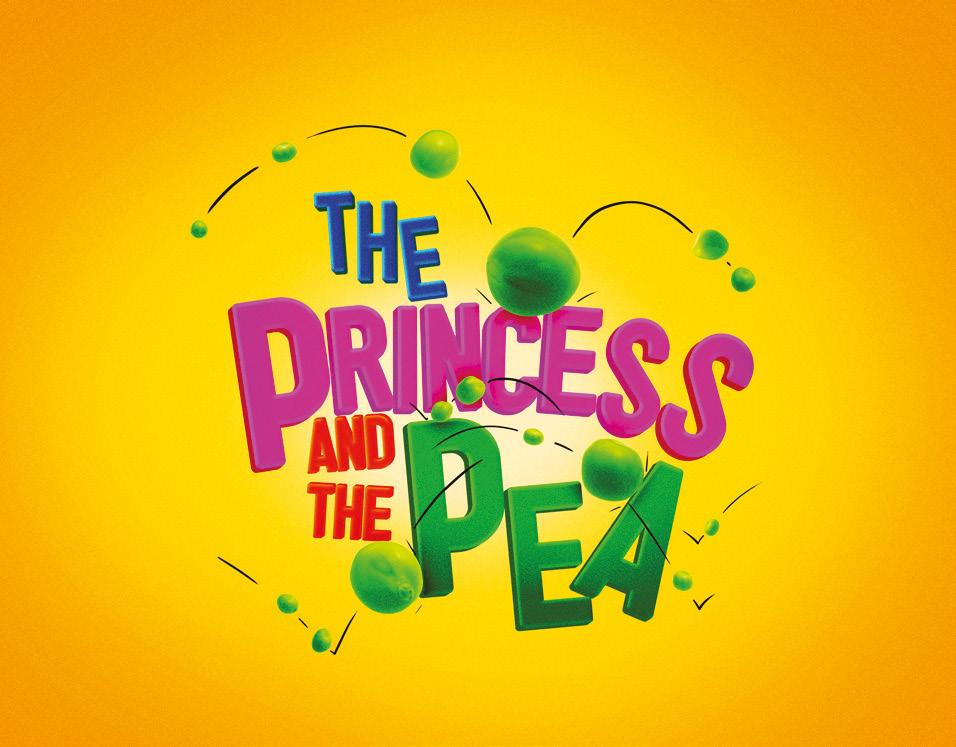
Familiesonline.co.uk Families South East London 3
CONTENTS
us discover how babies & kids learn!
recruiting infants, toddlers and children to take part in fun studies at Birkbeck’s BabyLab & ToddlerLab in central London.
and
who visit receive a thank you gift and we refund your travel expenses. Register today!
all Young Scientists!
We’re
All babies
children
Calling
Families South East
3926 1207 babylab@bbk.ac.uk www.cbcd.bbk.ac.uk Linda Editor,
Editor Linda Stone editor@familiesselondon.co.uk
Contact us Education
classes Parenting What’s On Health Birthdays 4. 7. 8. 11. 12. 14. 15. In this issue
product is made of material from well-managed, FSC®-certified forests and other controlled sources. Families is a registered trademark of LCMB Ltd, Remenham House, Regatta Place, Marlow Road, Bourne End, Bucks SL8 5TD. The contents of this magazine are fully protected by copyright and none of the editorial or photographic matter may be reproduced in any form without prior consent of Families Print Ltd. Every care is taken in the preparation of this magazine but Families Print Ltd, its distributors, franchisees and LCMB Ltd cannot be held responsible for the claims of advertisers nor for the accuracy of the contents, or any consequences thereof.
Early years Camps, clubs &
This
Tickets from £7 Ages 2+ A Unicorn co-production with New Vic Theatre and Upswing A Unicorn production in association with Theatr Iolo TWO GREAT SHOWS FOR LITTLE ONES BABY SHOW 14 MAY - 9 JUN Tickets from £15 Ages 6 – 18 months IT’S BABY’S FIRST ADVENTURE! 17 MAY – 16 JUN
Supporting your child’s memory retention
By Erin Miller
Does your child struggle to remember things they have learnt at school? Cognitive science can help us to understand how our children’s brains work and how they will learn best.
In order to remember, we need to store information in our longterm memory. Around thirty years ago, Australian psychologist John Sweller published a paper which has significantly advanced our understanding of how information passes from the working memory into the long-term memory. The theory that came from his work is called Cognitive Load Theory (CLT) and it is worth having a basic understanding of the theory, so that we can support our children when they are struggling to remember information they learn.
When a child first learns new information, it is held in their working memory. The working memory is limited and if it is overloaded, it becomes very difficult to transfer that information into the long-term memory.
Sweller estimated that only five to nine items can be held in the working memory at any one time. Interestingly, it is thought that the long-term memory is unlimited in its capacity. So, to give your child the best chances of success in both formal exams and in being creative, we must help them to shift information into their long-term memories. Once information is stored there, it can be retrieved when it is needed and has therefore been learnt.
The golden rule is to not overload a child’s working memory. A teaching method called ‘chunking’ is now helping children to

Why memorisation matters
Memorisation has a somewhat bad reputation and can seem out of date. We automatically associate memorisation with dingy classrooms where rote learning takes place: think chanting times tables or learning endless French verb endings.
Instinctively, we want something more exciting for our children than simply memorising information when they are at school. However, in order to be creative, our children do need to memorise information. For example, creativity in story writing cannot occur without a child having information about narratives and banks of exciting vocabulary stored in their long term-memories.
With the whole world of information now available with just a few keyboard taps, thanks to the likes of Google and increasingly ChatGPT, it might be tempting to think that memorisation is not as important as it used to be or even necessary. However, for the reasons explained above and for the fact that our children are still assessed (in SATs and GCSEs) essentially on what they remember, we can conclude that memorisation is as important today as it ever was.
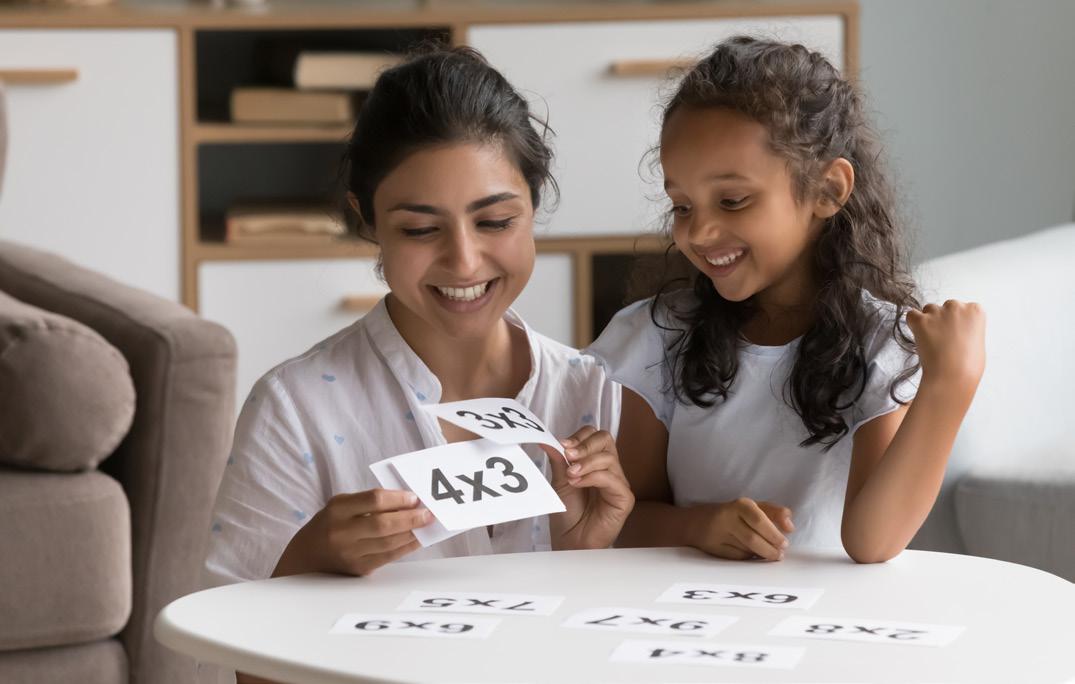
retain information for longer. Chunking involves breaking down information into smaller (bitesize) chunks. By focusing on just one idea at a time, children are able to digest and recall the information.
Whilst this may sound simple and even obvious, breaking down information into chunks can be tricky, as they often need to be even smaller than you might imagine. For example, in answering a question about history, consider how many bits of micro information that your child will need. Try to keep information in the five to nine range.
Ultimately, CLT has helped educators to design learning to support the way that children’s brains work. This is, of course, largely the job of your child’s teacher. However, when parents understand and arm themselves with this knowledge, they can use it to support their child’s learning at home and help them flourish at school.
Erin Miller is a teacher with a keen interest in how research can be used in the classroom to improve learning.

Start by removing the technical distractions
Working memory is proof of our limited attention span. Our children are surrounded by modern technology which can overload their brains. Webpages and apps with lots of functions, images and options are likely to overload cognitive capability; research has shown us that simpler designs work better when it comes to memory.
Therefore, when you’re focusing on getting your child to remember something, try to eliminate distractions. This starts with removing technology. A mini whiteboard at home can be helpful in presenting just one piece of information at a time.
Where technology is necessary for the learning task, ensure only the relevant window is open. When messages or notifications are popping up, this takes up space in your child’s working memory. Multi-tasking is a myth when it comes to learning and remembering new information.
Ultimately, when your child is struggling to understand or remember something, one of the most helpful things you can do is to remove technology and start working on paper.
Familiesonline.co.uk Families South East London 4 EDUCATION
Broadening your child’s vocabulary
By Jemma Z Smith
Vocabulary development is often something that parents mention when they approach a tuition company. Unfortunately, this area of learning does not have a ‘quick fix’ solution. Vocabulary acquirement, retention and application takes a long time.
Children need to be exposed to new vocabulary several times in several different contexts in order to fully absorb it and use it in their own writing and speaking, recognise it in a range of uses and be able to adapt it (for example, adding prefixes and suffixes) when questioned in a test environment.
Vocabulary is a vital aspect of primary education, especially for pupils preparing for entrance exams. A rich vocabulary not only enhances language skills but also serves as a key tool for academic success.
Understanding words in various contexts is fundamental for primary pupils. It allows them to grasp the meanings and usage of words, which helps to improve their comprehension skills.
Additionally, a strong vocabulary assists in spelling tasks, making children more aware of homophones and homographs, thus avoiding common pitfalls in their writing, particularly in time pressured test conditions.
For example, in some verbal reasoning papers, children may be presented with a choice of synonyms to match together: wind, reign, meander. In this example, wind (verb) and meander are synonyms but the child may read it as wind - the noun - due to its position next to a word that sounds like another type of weather but is spelt differently.

Having a broad vocabulary proves invaluable when preparing for entrance exams as it enables children to infer meanings and understand the overall message of a text without constantly referring to a dictionary, which although a useful skill, can break the flow of reading.
Encouraging reading for pleasure is a powerful strategy to improve and develop children’s vocabulary. Parents should emphasise the importance of reading anything and everything, from storybooks to comic books, menus during meals and signs while out and about. Such diverse reading opportunities expose children to varied language structures and expressions, contributing significantly to the expansion of their vocabulary banks.
If you can convince them to read some of the classic works of Dickens and perhaps some JRR Tolkien, that is great but all reading material can be useful.
Jemma Z Smith is Director of The Education Hotel. For further advice, visit www.educationhotel.co.uk



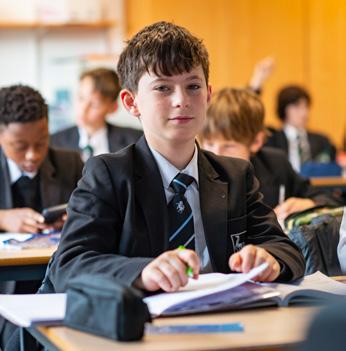

Familiesonline.co.uk Families South East London 5 EDUCATION
Hot water burns like fire
By Jenni Dunman
Did you know that hot water burns like fire? According to the British Burn Association, more than seven thousand children were burned or scalded in 2022 alone in England and Wales. This figure doesn’t include the thousands seen and discharged in A&E. These are the children who were so badly injured they had to be admitted to a Specialist Burns Unit.
Most accidents that cause burns and scalds to babies and children involve hot water. So let’s take a look at the risks within the home.
Hot drinks
Hot drink burns are all too common but easily preventable with these simple rules:
Keep hot drinks out of reach of young children. Place them at the back of the kitchen surface and never on a tablecloth or teatowel that a small child might reach and pull down;
Never carry a hot drink whilst carrying a baby;
Never pass a hot drink over the heads of children.
Hot water bottles
Hot water bottles can be dangerous and cause burns if they are not cared for or used safely. Rubber deteriorates over time so old hot water bottles can burst or leak and cause serious burns. Check for signs of wear and tear regularly. Look for the flower symbol, which indicates exactly when it was made and don’t use if it’s more than two years old. Never fill a hot water bottle with boiling water.
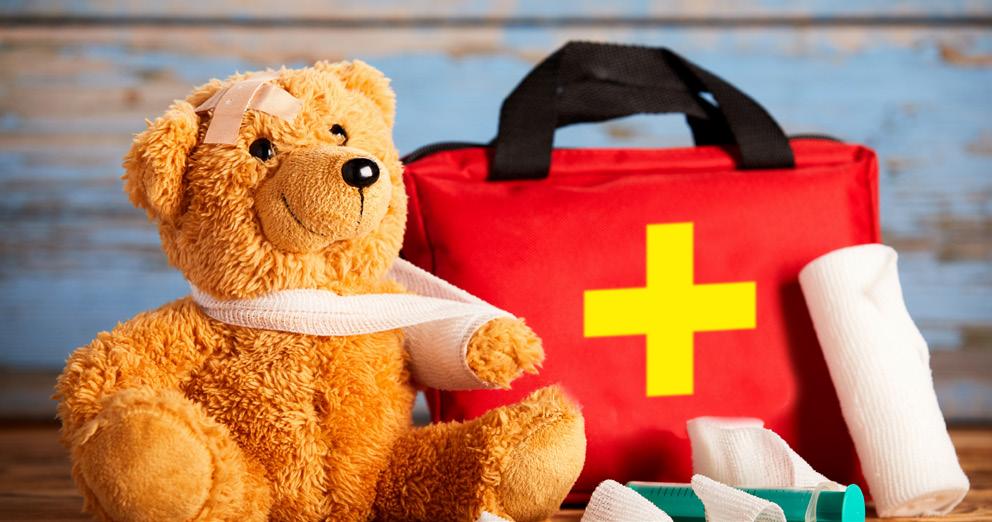
Top items for your home First Aid Kit
Digital thermometer. The NHS recommends under-arm thermometers for under 5s.
Ice pack. A top tip for when you’re at home is to pop a bag of marshmallows into a plastic food bag and freeze for an instant ice pack. Remember, never put ice directly on the skin; always wrap it in a tea towel before applying the cold compress.
Liquid paracetamol. Don’t forget that you can give your little one pain relief if they hurt themselves in an accident. It’s not just for when they have a fever and are unwell.
Alcohol-free wipes. Use to clean wounds before dressing them.
A red flannel. When a child hurts themselves it can be scary to see lots of blood. Having something red to help mop it up can help disguise the severity of more nasty cuts.
It may also be useful to keep a basic first aid manual or instruction booklet with your First Aid kit.
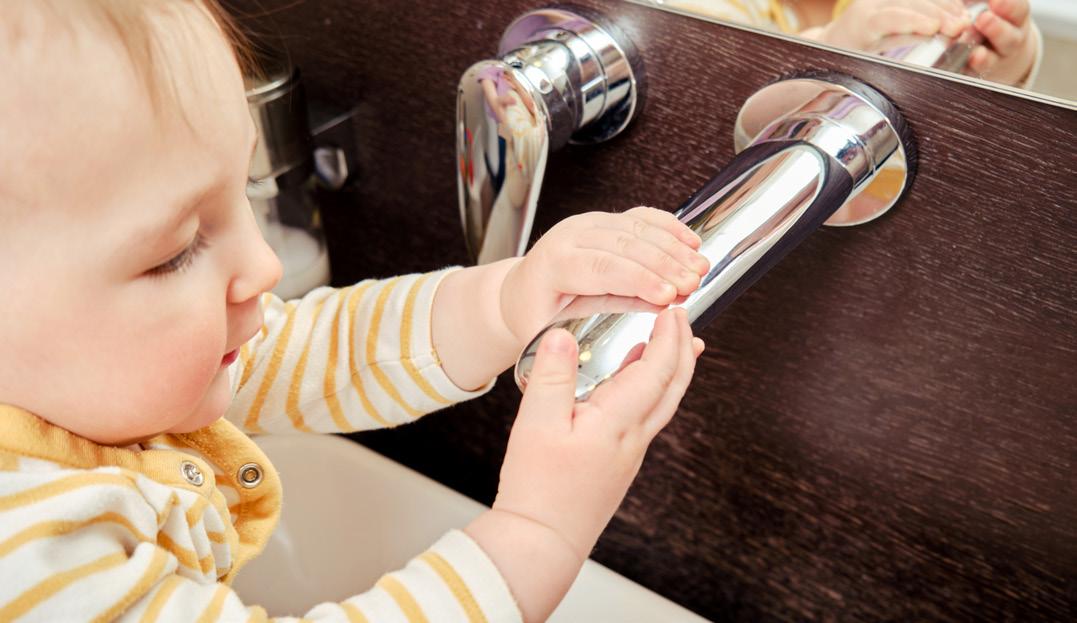
Saucepan and kettle spills
It is important that children are not left alone around hot cooking surfaces; keep them out of the kitchen when cooking or preparing food and hot drinks. Always use the back burners on the hob when you can, turning handles in and keeping kettles and their cords out of reach of little hands.
Baths and showers
Hot water can pose a real danger. Bath and shower water can cause such bad burns that children need years of treatment and may be scarred for life. It only takes one second to get a deep burn in hot water when the water temperature is at 70°C. Always run cold water before hot and test the temperature with the back of your hand. Never leave a child alone in the bath, even for a second.
Jenni Dunman is CEO of Daisy First Aid (www.daisyfirstaid. com) which is an expert in baby and child First Aid. She’s a regular speaker at The Baby Show (www.thebabyshow.co.uk) which returns to NEC Birmingham 10-12 May, Manchester Central 7-9 June and Olympia London 25-27 October.

What to do if your child gets burned
It is important to act immediately if your child gets burned from any source. The most common sources of burns in the home are hot water and perhaps less predictably, picking up hair straighteners. Here are the steps to follow:
REMOVE any loose clothing or jewellery. Don’t remove anything that is stuck to the skin.
COOL the burn by holding it under cool (not freezing) running water for twenty minutes.
CALL for help by dialling 111 for advice or 999 in an emergency.
COVER the burn using cling film to keep it clean and get it checked by a medical professional. You can buy special burns creams and burns bandages from most pharmacies in the UK.
Finally: consider signing up to a baby and child First Aid course. This will give you practical skills which can make all the difference in an emergency. It’s the qualification you hope you’ll never need.
Familiesonline.co.uk Families South East London 7 EARLY YEARS
It’s time for summer camps
By Ellie Malt
I once spent a freakishly hot week in the summer holidays learning to sail near the Isle of Wight. As a tween, I was dazzled by the teenaged sailing instructors who seemed endlessly cool. I’m not saying my sailing skills were Olympian but it felt like a modern version of Swallows and Amazons. The sense of freedom and adventure was amazing. My point? Any programme run with experience and enthusiasm can be more than just a childcare solution.
Holiday camps can be daunting and my children enjoy them more if they go with a friend. Perhaps the pandemic made them cautious? Having asked around, it seems they are not the only ones.
Jenny, a mother of a 7 and 9-year-old told me: ‘My kids weren’t interested in going at all but three hours at a tennis camp turned out to be a good first step.’ Half-day camps are a great introduction to camp life.
It’s also important to think carefully before automatically sending siblings to the same camp. ‘Choose carefully!’ warned Maggie, who has two girls with very different interests. ‘I sent both of mine off to the same sports camp. At the end of the first day, one came home on top of the world, the other refused to go back.’
If it is your child’s first time at a summer camp, you can ease their worries by choosing something that really dovetails nicely with their hobbies and personality.
If you think a tech camp might hit the mark, try something with a more specialist focus on robotics, coding and inventions. Next Thing Education run programmes across the UK led by professional creators, inventors and tech enthusiasts. The children learn creative, technical and logical skills. See www.nextthing.education for details.
For outdoorsy kids, summer is the perfect opportunity to immerse them in the most inspiring local scenery.
Do you live near a woodland? Forest Schools are ideal for nature loving kids, encouraging play alongside learning bushcraft skills, all in a natural setting. You can find your nearest by looking on the database of the Forest School Association which ensures site leaders have Forest School L3 qualifications or equivalent. Visit www.forestschoolassociation.org for details.
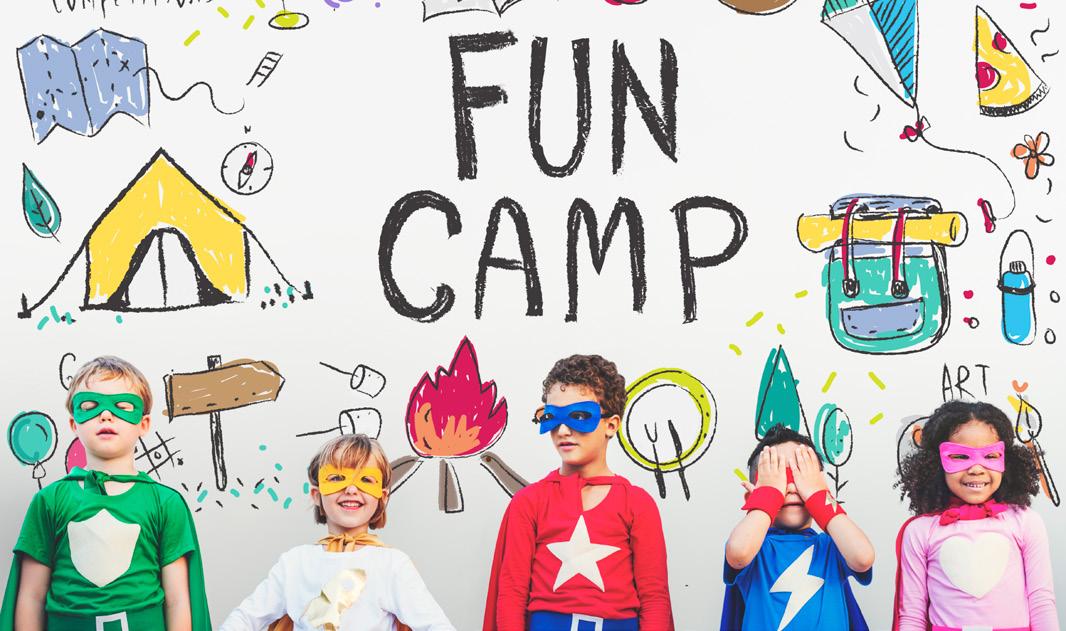
If you are heading to the coast for a holiday or even a short break and your child can swim and enjoys being in the water, a surf school is a good option to consider. Surfing England (www.surfingengland.org) has a list of more than fifty accredited surf schools and coaches. They’ve also created the Grom Squad programme for kids to learn about protecting the environment and sea safety.
Ellie is a mum of two daughters, living in Surrey.
Budget-friendly options
If your child is under 11-years-old, you may qualify for a Tax-Free Childcare account (which you can set up on the Government Gateway website). The government contributes £2 for every £8 you put into the account. To spend the money on a summer camp you will need your unique reference number from your account.

Many camps still accept childcare vouchers. The schemes are closed to new applicants but are still valid if you joined on or before 4 October 2018.
The Summer Camps Trust (www.summercampstrust.org) charity aims to make residential summer camp as normal for UK children as it is for kids in the US. Offering access to kids from all backgrounds, their Tryout camps offer reduced rates for first timers.
28&29 May 10:00AM-4:00PM
Ages 6-12 If your child loves to climb, hang upside down or tumble about this could be the camp for them £72 1 day, £135 for 2 days


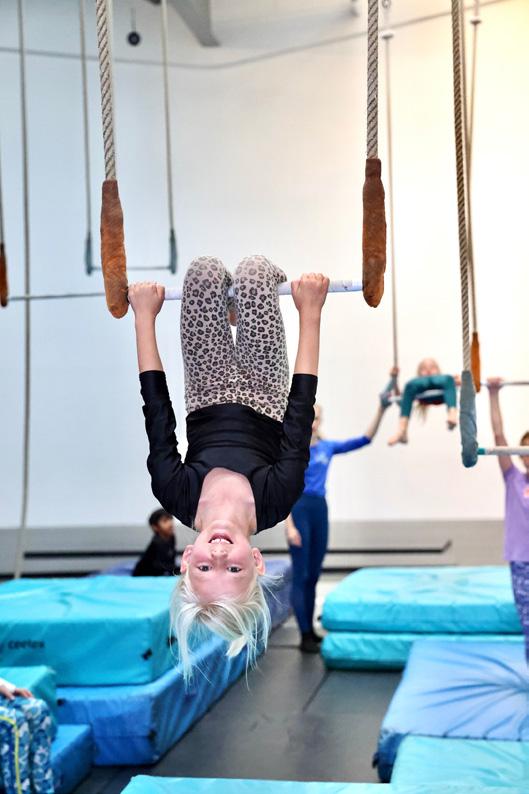

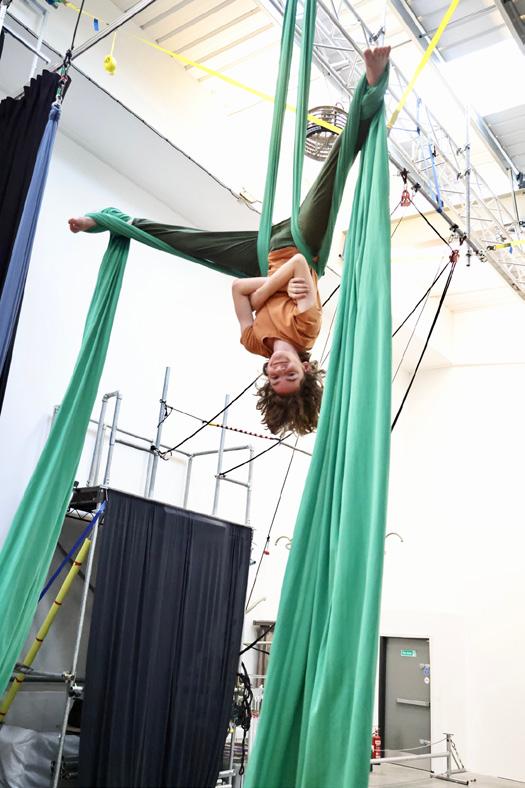
30 May 3:00-5:00PM
Ages 6-12, no experience necessary! Your child will try Flying Trapeze, Aerial Sling and Static Trapeze £40 per child
The Holiday Activity and Food programme (HAF) is a government-funded holiday camp programme offering free places to any child who is eligible for free school meals. Head to your local authority website and search for HAF. Note that each area has a different name for its HAF funded programmes.

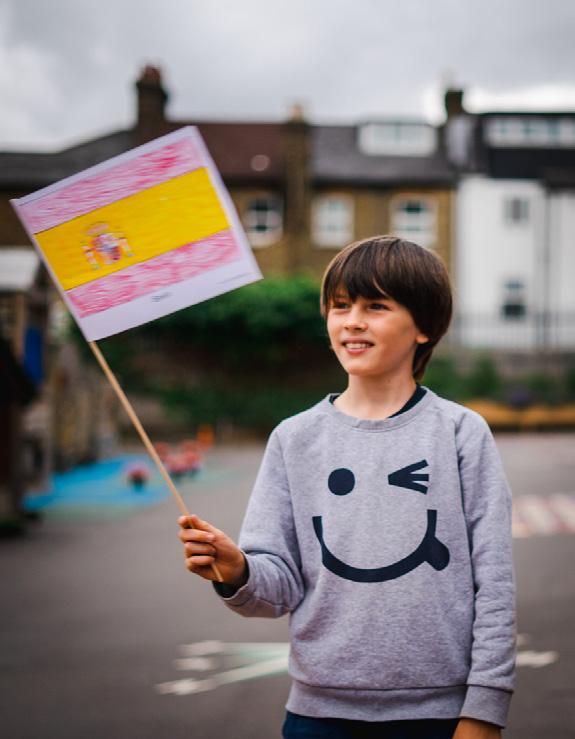
Familiesonline.co.uk Families South East London 8 CAMPS, CLUBS & CLASSES May Half May
Term Camps
Half May Half Term TASTER Term TASTER https://www myaerialhome co uk MY AERIAL HOME Unit A2 Bell Green Retail Park SE26 4PR
Half Term Camps
May
www.globalcamps.co.uk Ofsted registered Holiday Camp for ages 4-12
Learning to swim
Learning to swim is the only physical activity which can save your life.
In recognition of this, all schools must provide swimming lessons in Key Stage 1 or 2 (ages 5 to 11), as a statutory sport within the Physical Education (PE) curriculum.
In particular, pupils should be taught to perform safe selfrescue in different water-based situations; swim competently, confidently and proficiently over a distance of AT LEAST 25 metres and use a range of strokes effectively, for example, front crawl, backstroke and breaststroke.
However, Swim England recommends that your child doesn’t give up on regular private swimming lessons once they start swimming with school as these are crucial to their continued development and ultimately safety.
The aim of school swimming and water safety lessons during PE are to teach your child to be safe in and around water, with the emphasis on water safety.
At private lessons, your child will be taught more in-depth skills and techniques than they will at school. Regular private lessons progress way past the minimum national curriculum requirements and your child continues their aquatic education towards an active and healthy future.
What will my child learn during school swimming?
As well as learning to swim the basic strokes, your child will learn how to be safe around different water environments eg beaches, lakes, canals. Your child will be taught how the skills they learn in their swimming lessons can be used in an emergency situation.
Your role
As a parent, guardian or carer you play a vital role in encouraging your child to swim and learn about water safety, survival and lifesaving. You can help your child grow their water confidence through enjoying fun family swimming sessions together and also talking about water safety know-how.
Make sure your child has everything they need to take part in their swimming lessons and also find out what their current attainment level is and what they should be achieving.

If you are in a Parent Teacher Association (PTA)
You have an important role to play. Children who don’t learn to swim at school often never learn at all. In your regular meetings, you can encourage and support your school to sign up to the Charter and take swimming and water safety seriously, as well as making sure it stays on the agenda.
Do you home school your children?
According to latest BBC figures, home-schooling in the UK has increased forty percent in the past three years. Parents who home school must ensure their children receive provide a broad and balanced, full-time education from age 5. Whilst you don’t have to follow the national curriculum, you will almost certainly want your child to learn to swim to its required standards.
Swim England recommends your child completes the Swim England School Swimming and Water Safety Charter, to be competent and confident in all water environments and proficient in all the swimming strokes.
This will ensure they can swim the minimum required twenty five metres by the time they would normally leave primary school.
Swim England also suggests enrolling them on regular lessons that follow the Swim England Learn to Swim Programme, as well as participating in water safety campaigns such as Swim Safe.
Talk to your local lesson providers about the potential for taking part in bespoke school swimming lessons.
For further information, visit www.swimming.org




Familiesonline.co.uk CAMPS, CLUBS & CLASSES 01732 457 100 Venue-based Keyboard Tuition FREE TRIAL! SE/SW Small groups, 4-8 years Home Keyboard Tuition 5-14 years Step by step videos at your own pace! www.funkymonkey.info Themed Holiday Workshops, Beginners 4+ yrs 3 fun ways to read, write & music with love
Ideal outdoor sports clubs for kids
As children get older, they get less active. To counter this, getting them involved in a sport from a young age can help them keep fit and encourage the development of a lifetime habit of regular exercise.
Here are some outdoor sports options to consider:
Athletics
Athletics offers opportunities for use of the widest range of skill sets of any sport as its various disciplines provide the opportunity to throw, run or jump. It is suitable for all children, from toddlerhood, as different body shapes, skills and preferences suit different activities. Most junior athletics clubs run taster days or tester sessions so that new participants can see whether they like the club before signing up. Or you can try a specialist class like Mini Athletics for under 5s. To find a local club, visit www.englandathletics.org
Rugby
The first years of rugby are not about scrums, mauls and tackling or the complicated rules of the game. Boys and girls alike are encouraged to play a simple, non-contact game involving tags, in which tackles are replaced by touching a player or removing a tag from their clothing. The focus is developing passing and running skills. Your local rugby club is likely to have junior and ‘mini’ teams starting at age 6. To find a local club, visit www.englandrugby.com
Football
Many local football clubs run teams for boys and girls starting from age 7 as well as regular community coaching programmes for children from age 3, with the emphasis on skill development


and fun and not on winning. There are many providers offering classes introducing the sport to children as young as 2 years. To find a local club, visit www.thefa.com
Tennis
Children from 3 years of age can learn the basic rules and skills of tennis. The Lawn Tennis Association (LTA) runs the Mini Tennis programme which uses smaller courts and equipment, combined with lower bouncing balls for children ages 3 to 10. Also run by the LTA, Tennis for Kids offers children ages 4 to 11 an introductory course delivered by specially trained coaches at various UK locations. For more info, visit www.lta.org.uk
Multi-Sports
These allow kids to try out a variety of sports such as athletics, rugby, football, netball, tennis and cricket. These are often available from independent providers and/or local authorities in term time and school holidays. They are a great way for kids to experience a number of sports and find out what they like for themselves.







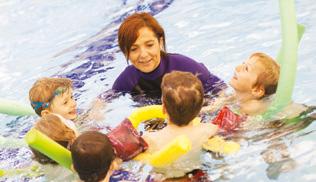


Familiesonline.co.uk Families South East London 10 CAMPS, CLUBS & CLASSES
NEW OFF-PEAK MEMBERSHIP: “SWIM, GYM AND SPIN” THE SPORTS CLUB get fit, have fun, meet people NowMembership Includes IndoorCyclingClasses Weekdays 8-10pm, Saturdays 2-6pm, Sundays 5-9pm plus weekend Squash dcsportsclub.co.uk /DulwichCollegeSportsClub @dcsportsclub.dulwich Individual membership only, no other categories. Hurry, only 60 memberships available! See our website for enrolment details and T&C’s.
Involving your kids in social action
By Anoushka Freeman
In a world where compassion and empathy are invaluable qualities, parents play a crucial role in shaping their children into responsible and caring individuals. Engaging in social action with your children helps to instil these lifelong values and more. Plus it can be a great way to spend quality family time. Here’s how you can meaningfully involve your kids in social action.
Never too young to talk
Start conversations early. While young children might not grasp complex global issues, introducing the concept of kindness, empathy and helping others sets the foundation for a compassionate mindset. Use age-appropriate language and share stories that illustrate the power of positive actions.
Maximise everyday kindness
Use everyday activities. Teach your children the significance of small acts that make a difference, like picking up litter or turning off lights. These simple actions help normalise active citizenship.
Lead by example
Children learn best through example. Showcase the values you want to instil by actively participating in social action yourself. Whether giving to a charity, helping a neighbour or volunteering your time, your actions provide a powerful model for your kids to emulate. Wherever possible, take the opportunity to include your children in the activity. For example, if you are donating to charity, explain why you chose the charity and what impact your donation may have.
Explore different ways to help
Expose your children to a variety of social action opportunities such as going on litter picks or writing to MPs about causes they care about. This not only broadens their understanding of societal needs but also allows them to discover where their passions lie in making a positive impact.
Empower children to choose
Invite your children to choose a cause that resonates with them. Support them in researching, investigating and exploring different areas of interest. This empowers them to take ownership of their social action and enhances their critical thinking skills.
Commit to it
Establish a dedicated time for social action in your family routine. This commitment can be reinforced through accountability
Get inspired

10-year-old Liam Hannon’s dad set him the challenge of doing something to give back to his community. After some discussion, Liam settled on helping homeless people. He enlisted his dad to help him make and distribute sandwiches, each with a special handwritten note or drawing.
By spreading the word to friends, family and through social media, donations and offers of help poured in. The duo has gone from distributing forty bags in their first week to hundreds of bags per week!

measures, such as creating a charity jar that accumulates funds in response to helping with chores around the house. This encourages consistency and also reinforces the value of sharing one’s time, treasure and talent to help others.
Make traditions
Incorporate social action into family traditions. Whether it’s creating Christmas shoeboxes, donating to a food bank or including a charity birthday wish list, these traditions instil a sense of purpose and giving that extends beyond individual actions.
Reflect and celebrate
Social action should not be a one-off event. Keep the conversation alive by discussing ongoing initiatives and celebrating their impact. This continuous dialogue helps children understand the long-term impact of their actions.
Spending time working towards a shared goal is a brilliant way to strengthen family connection. When that shared goal helps others, such as in the case of social action, you are also helping to nurture compassionate, responsible and socially aware individuals. These values will last for life; research shows that young people who engage in meaningful social action are twice as habitually philanthropic in later life.
So by following these practical steps, you are actively shaping the next generation of change-makers!
Anoushka Freeman represents www.superkind.org, the social action and charity platform for young people who want to be change-makers. Find free resources to help young people learn, be inspired and get empowered to make a positive difference to their communities and the world.
Benefits of social action

Studies have shown that social action has a vast array of benefits for young people who take part in it. It builds empathy, resilience, leadership and teamwork. It has been linked to higher grades and lower truancy and can help hugely with employability.
Research from the Cabinet Office showed that engaging in social action lowered anxiety levels in young people by over twenty percent. It’s even been shown to chemically contribute to happiness levels through the release of endorphins – the socalled ‘helpers’ high.’
Familiesonline.co.uk Families South East London 11 PARENTING

1 June
The Mughal Miniatures Dance Party
Enjoy an outdoor show with popup pictures, dance workshops and a live DJ to keep the party going. Ages 5+.
1-2 June
Grand Soft Day
A playful show about always being prepared even though you don’t know what the day will bring.
Ages 2-6.
Regents Park Open Air Theatre
Regents Park NW1 4NU www.openairtheatre.com
17 May-8 June
The Enormous Crocodile
The Enormous Crocodile is weaving his way through the jungle in search of delicious little fingers and squidgy podgy knees in this musical version of the Roald Dahl story.
15 June-20 July
The Secret Garden
Frances Hodgson Burnett’s beloved and radical story about the magic of nature and the nature of magic is adapted in a new production by Holly Robinson and Anna Himali Howard.
Woolwich Works
The Fireworks Factory SE18 6HD www.woolwich.works
1 June
The Magic Word
With magical dancers, stunning costumes, crystal clear storytelling and lots of humour, this is a heart-warming tale for all ages.
Puppet Theatre Barge, W9 2PF www.puppetbarge.com
Until 19 May
Pea
Join Tiffany in her quest to get a good night’s sleep. Ages 4+.
4 May-2 June
Suitcase Circus
Meet Wobulous Discombobulous, the anarchic sock as he presents a line up of extraordinarily talented performing objects, all with their own unique and captivating storylines. Ages 5+.
8-16 June
My Shadow and Me
One person (and his shadow) meet and go on an incredible, imaginative, shadowy journey where creatures emerge, engage and transform beautifully. Ages 4+.
Actor’s Church
St Paul’s Church WC2E 9ED www.actorschurch.org
16 May
Baby Gospel Family Concert
An uplifting family concert of soul, Motown and gospel music, featuring the astonishing vocal talents of London’s CK Gospel Choir.
Bach to Baby
Various dates and venues www.bachtobaby.com
Critically-acclaimed classical concerts for babies and their grownups. Outstanding musicians put on exhilarating performances where babies can ‘join in’ with as much noise as they like!
Bring Your Own Baby Comedy
Various dates
Greenwich, Crystal Palace, East Dulwich and Bromley www.byobcomedy.com
A funny, friendly afternoon of top comedy, where baby can come too and join in with the rumpus. Shows feature a new line up of comedians each month with two acts plus a compere. Ages: grownups plus under 12 months.
Picturehouse Cinemas
West Norwood, Greenwich, East Dulwich and Bromley
www.picturehouses.com
Sit back and enjoy a big-screen film in a cinema that welcomes families. Sessions include Watch with Baby, Toddler Time, Autismfriendly and a weekly Kids Club.
Horniman Museum and Gardens
London Road SE23 3PQ www.horniman.ac.uk
Until 3 November
Dinosaur rEvolution
Which dino features are better – horns, spikes or quills? Did T-rex actually have feathers? And how did some dinosaurs survive extinction? Find out through animatronic models, fossil skeletons and skulls, dress up, games and more.
Daily from 5 May
Under the Sea Soft Play Slide, balance, climb and bounce at a brand new aquarium-themed play area among netted play frames, bubbling ball ponds, fish shaped rockers and soft toys. Ages 6 and under.
Eltham Palace
Court Yard SE9 5QE www.english-heritage.org.uk
25 May-2 June
Kids Rule!
Meet Anne & George Boleyn at Eltham Palace and discover Anne’s rise in the Tudor Court. Learn all about courtly etiquette and have a go at Tudor dancing. Try your hand at writing poetry and enjoy fun games.
HMS Belfast
The Queen’s Walk SE1 2JH www.iwm.org.uk/hms-belfast
Until 24 May
Life at Sea: Scrambled Eggs
Follow a trail, help the ship’s cooks find hidden eggs and see where a team of six bakers would have worked to produce enough bread for several ships.
Weekends
Meet the Crew
Delve into life onboard the ship through eye-witness accounts of sailors and hands-on objects. Ages 7+.
National Maritime Museum
Romney Road, Greenwich SE10 9NF
www.rmg.co.uk/nationalmaritime-museum
26 May-2 June
Half-Term Fun
Drop in for daily make-and-do workshops. With a focus on engineering, families can engage through creative experimentation with concepts linked to RMG’s collections. FREE.
22 June
Windrush Day
A celebration of Windrush Day across the National Maritime Museum, Queen’s House and grounds, offering talks, performances, music, food and workshops for all ages. FREE.
National Portrait Gallery St Martin’s Place WC2H 0HE www.npg.org.uk
15 May
Little Explorers FREE monthly sessions where families explore the gallery and the collection through stories, songs and making activities in a fun and relaxed atmosphere. Under 5s.
Queen’s House
Romney Road, Greenwich SE10 9NF
www.rmg.co.uk/queens-house
18 May
Caribbean Takeover
Celebrate the impact of Caribbean culture on a day filled with talks, workshops, food and music for all ages.
27, 29, 31 May
Character Actors
Meet different characters from history who all have fascinating tales to tell of life in the royal residence.
Royal Observatory Greenwich Blackheath Avenue SE10 8XJ www.rmg.co.uk/royalobservatory
Daily Shows
The Sky Tonight
A live show taking visitors on a tour of what can be seen in the night sky, complete with a fly-out to the edge of the visible universe. Ages 7+.
Weekends and Holiday Weekdays
Ted’s Space Adventure
Explore the solar system with a bear named Ted, learning about the things we find there and how they affect us. Ages 3-7.
Cutty Sark
King William Walk SE10 9HT www.rmg.co.uk/cuttysark
First Weekend of Every Month
Family Fun Weekends
Climb aboard for family-friendly workshops and activities for all ages.
Weekends and Holiday Weekdays
Meet the Characters
Meet the captain, chat with the cook and take a tour with Nannie the Figurehead!
Florence Nightingale Museum Lambeth Palace Road SE1 7EW www.florence-nightingale.co.uk
25 May-2 June
Half-Term for Families
Fun and interactive family activities including nursing stories and a hands-on poppies making craft sessions.
Dulwich Picture Gallery Gallery Road SE21 7AD www.dulwichpicturegallery.org. uk
Art Sundays
Be inspired to make art together as a family in these FREE creative workshops at the Gallery.
Family Fridays FREE, expressive art-inspired activities for families.
Last Thursday of the month
Mini Masterpieces
Take your little one on a journey through the Gallery to discover people, places and animals in paintings, followed by a ‘messy play’ art-making activity. Ages under 5.
Familiesonline.co.uk Families South East London 13 WHAT’S ON
South
East
MUSEUMS & MONUMENTS
say you saw these events in Families South East London magazine!
Queen’s House
Please
Seven ways to help your anxious child
By Poppy O’Neill
Seeing your child struggle with anxiety can be so difficult for parents and carers. Our instincts to protect our children kick in and while we may try to take away the source of our child’s worry, this can backfire in the long run.
Really supporting our children to understand and cope with feelings of anxiety means showing them compassion while empowering them to build resilience and it’s a tricky balance to strike! Here are some of my top tips for supporting children when they feel anxious.
Allow the feeling. Instead of trying to sweep away your child’s worries with logic or reassurance, acknowledge and show understanding for their emotions. You could say something like: ‘You’re feeling really worried, it’s so hard when you don’t know what’s going to happen next.’ When we show children that we see their emotions and we’re not upset or afraid of them, they’re reassured that they’re not alone and that emotions are not something they need to be afraid of.
Get moving. Movement, especially rhythmic movement like walking, dancing or jumping, is very powerful for calming anxiety. It soothes the parts of our brain that logic can’t reach and helps your whole body feel that bit less tense. If your child feels overwhelmed or is struggling to calm down, focus on getting their body moving first, rather than on talking it out.
Get your child to help you. Easy, low-stakes chores around the house are an excellent way to connect with your child, build their self-esteem and calm anxieties. When we have a simple, easyto-achieve task to focus on, it helps our brains let go of worries, even if just for a little while. What’s more, helping to care for our

Rise in measles prompts vaccination campaign
A national campaign to boost uptake of a vaccine that protects against measles has been launched in England after a rise in cases of the potentially deadly disease.
Measles outbreaks have occurred around the country, including in London, with the West Midlands experiencing cases at their highest level since the mid-1990s.
The situation has led the UK Health Security Agency (UKHSA) to declare a national incident, with health experts warning further outbreaks could occur in other towns and cities unless uptake of the measles, mumps and rubella (MMR) vaccine increases.
Figures from NHS England suggest more than 3.4 million children under the age of 16 years are unprotected against this trio of serious and preventable diseases.
The new campaign will encourage children who have not had MMR vaccinations to receive their missed doses.
More info: www.bit.lyNHSMeasles

homes increases feelings of wellbeing and belonging, which are wonderful antidotes to anxiety.
Remind them of their capabilities. Anxiety can involve picturing the worst-case scenario and it’s tempting to dismiss these thoughts in an effort to reassure our kids. However, often facing the worst-case scenario head on is much more powerful. Even if your child’s fears aren’t rational, you can still chat about a plan for the eventuality they’re picturing. Whether it’s a zombie apocalypse or getting lost in a new school, you can have a conversation about what they would do, how they could handle challenges and who they could turn to for help.
One-on-one time. Having the undivided attention of one of their parents or carers is incredibly powerful for all aspects of children’s mental health. It doesn’t need to be a grand or complicated day out; taking them along to the supermarket or asking them to help you cook dinner is just as (if not more) effective. Frequency is key, so learn to spot these little opportunities for connection throughout the week and use them for some pressure-free bonding time.
Play. Studies have found that play helps us learn how to navigate the unexpected, so the more we play, the less anxiety we feel about the world around us. Naturally, play will look different depending on the age and interests of your child, so let them take the lead. Play can be anything from making up silly songs to card games to drawing; whatever fun, pressure-free activity your child can get absorbed in is going to be a brilliant antidote to stress and anxiety.
Take a deep breath. In times of anxiety, breathing can become shallow and erratic. Deep breathing helps release tension in the body, improves mood and promotes a sense of wellbeing. Teach your child to breathe slowly and deeply and you’ll give them a valuable relaxation tool they can use whenever and wherever they need it.
Anxiety is a part of being human. The key is to help our children recognise and understand how it works for them, rather than try to do away with anxious feelings altogether. Each interaction you instigate contributes to your child’s wellbeing and relationship with you. It can be hard but by boosting our children’s resilience and trusting them to navigate difficult emotions, they learn to trust themselves.
Poppy O’Neill has written several books on mental well-being for children and adults, including the bestsellers Don’t Worry, Be Happy and You’re a Star. Her most recent book How to Support Your Anxious Child is published by Vie.

Familiesonline.co.uk Families South East London 14 HEALTH
Get our digital mag! Sign up at familiesmag.co.uk/go IT’S FREE!
Birthday traditions
By Tamsin Ryan
The lovely thing about birthday traditions is that they don’t have to be big and expensive to be really fun and meaningful. They’re all about creating lasting memories and providing the perfect opportunity for a family photo, captured every year to see your family grow and change.
In our household, we have a ‘birthday book’ for our daughter. Every year we fill out a new page with what makes her special; from her favourite food or toy, to what she wants to be when she grows up. It’s going to make a lovely book to look back on in years to come! She also opens her presents first thing in the morning, before we’ve even got out of bed. Later, we’ll eat out with wider family members, at the favourite ‘fancy’ restaurant that we always go to for birthday celebrations.
Another great bonus of family traditions is that they can potentially replace the need for an all-singing, all-dancing birthday party. Sometimes quality time with the ones we love is more than enough and parties can take a back seat.
Here are a few fun ideas for you:

Add decorations and leave their presents at the end of your child’s bed, while they sleep. A lovely surprise when they wake!

Write your child a letter every year for their birthday, for a lovely keepsake when they are older. Or they could write something each year for a time capsule of their letters and drawings.

Write little post-it notes for the birthday child and hide them round their room, the house, in their school bag and their lunchbox.

Ask the birthday child to donate a toy of theirs to charity before they receive any new gifts. It’s a lovely way for them to acknowledge how lucky they are to receive gifts on their birthday and also clears some space to accommodate any new gifts.

Prepare a fantastic birthday breakfast feast, such as piles of pancakes covered in fruit, syrup and cream. Or maybe just start the day the best way - with birthday cake!
Something they want, something they need, something to wear and something to read. Gifting the birthday child with these is a lovely way to celebrate a birthday in a more grounded way.


Plan a scavenger hunt around the house and garden and ask the birthday child to solve clues in order to hunt down their gifts.

Offer a ‘yes’ day, where you agree to all requests from the birthday child. You may want to have a few ‘safety’ caveats for this day, to ensure certain requests are out of bounds.

Send their birthday card in the post, even if you are all at home; it’s always fun to receive mail.
Familiesonline.co.uk Families South East London 15 BIRTHDAYS
Eco birthday gifts
By Tamsin Ryan
At a time when we are all trying to reduce the amount of plastic we consume, it seems toymakers and our little ones are against us every step of the way, filling our homes with plastic toys and gadgets everywhere we look. Moreover, these colourful and joyous pieces of plastic often provide precious little fun before they are pushed aside for the next in line.
When the inevitable birthday party season comes along, gifting something that is a little kinder to the planet might also provide some longer lasting fun.
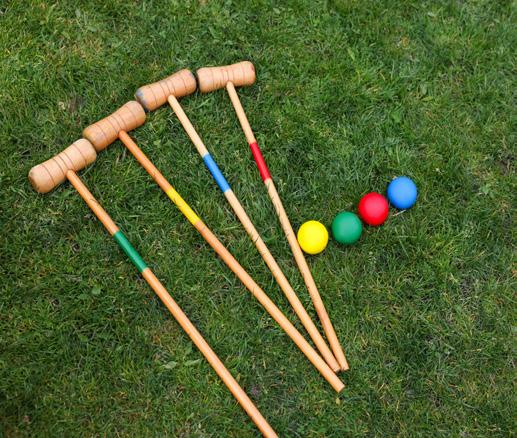
Garden games are a long standing favourite gift. They are great for getting kids outside and provide the opportunity for lots of family fun. Lovely wooden games such as quoits, Jenga and skittles will provide years of fun and last a lifetime.
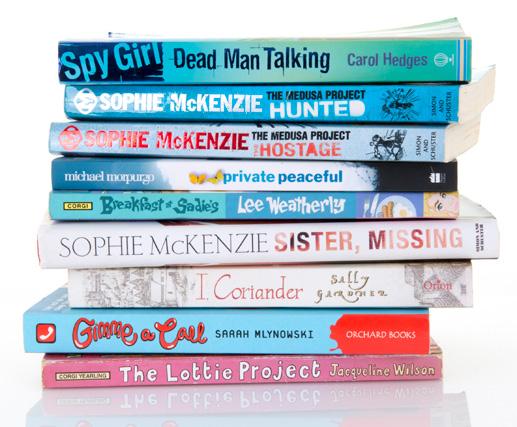
Books are often overlooked but can be such meaningful and enjoyable gifts. Favourite stories can be read and loved again and again and then passed onto siblings, friends or the next generation. Alternatively, a book token gives children the fun of browsing a real bookshop.
No presents! If you are having a party for your child, you may just want to ask for no presents at all, if you feel your child has more than enough. Alternatively, ask everyone to bring along a book that they have enjoyed reading and then do a book swap, so everyone goes home with a gift.

Preloved gifts are also a great option. As children often outgrow their toys before they really get a chance to play with them, you can find plenty of preloved toys that are like new. You save money, kids barely know the difference between new and preloved and aren’t bothered anyway. Try nearly new sales, charity shops or school fairs. If you’re short on time, www.rumage. com can search all your favourite marketplaces for you and filter by location so you can find a seller nearby, saving on postage.
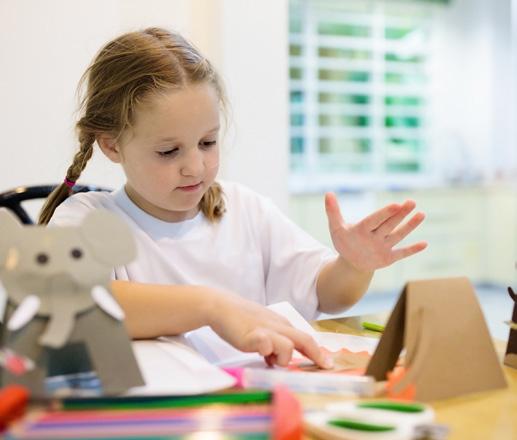
Lasting gifts. A subscription is a gift that keeps on giving, perhaps a monthly magazine or a craft box.


Non-physical gifts. Instead of stuff and more stuff, consider a fun day out or an experience that the whole family can enjoy or some dance, music or sports classes. Another idea is an annual (family) membership to a local amusement park, museum or similar, which means your gift can be enjoyed again and again throughout the year.

‘Fiver’ parties are also rising in popularity and it’s easy to see why. They reduce the pressure on parents to search for the perfect gift and also mean the birthday child can use the combined monies to buy a meaningful gift that they would really like.
For more birthday tips, read Tamsin’s blog at www.icecreamandjelly.com or check out her Instagram page @icecreamandjelly_uk

Handmade and upcycled presents add a really personal touch. You can make something bespoke that will be unique to the lucky recipient. Previously I’ve upcycled a scooter and a guitar for my daughter, which have been loved and adored.
Whatever gift you decide to go with, by consciously avoiding new plastic and making sustainable choices, your biggest gift will be to the planet - and thus the future of the birthday child. What more could they ask for?
Familiesonline.co.uk Families South East London 16 BIRTHDAYS BIRTHDAYS
BIRTHDAYS Families South East London 16




















































































